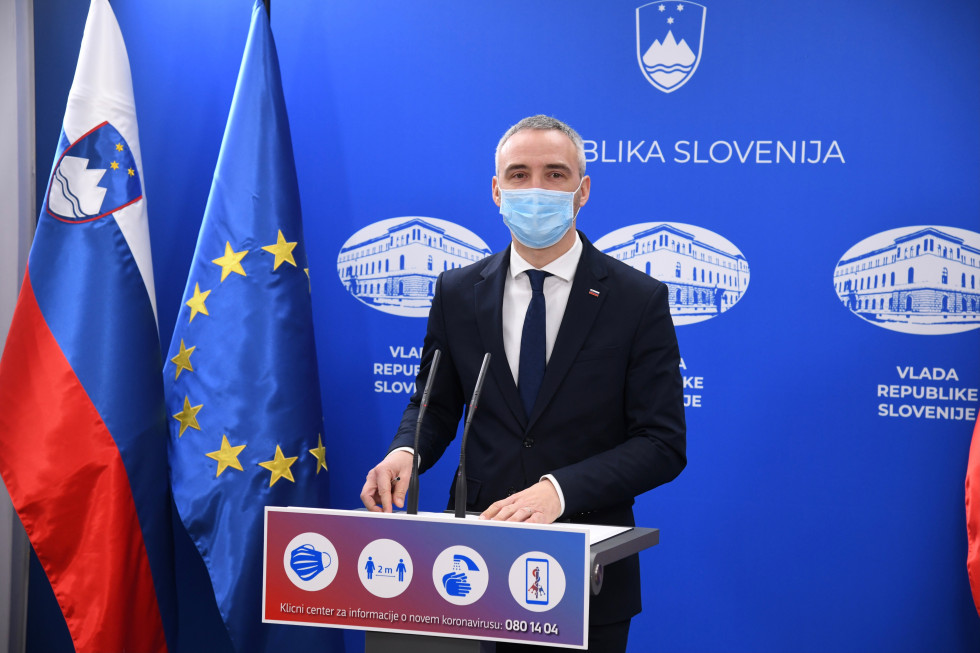Budget contains EUR 30 million for construction of nursing homes, in 2018/19 just 3 million
4,402 PCR tests were conducted on Monday, with 740 (16.8%) new positive cases confirmed. 37,830 rapid antigen tests were also performed. A total of 691 patients were in hospital yesterday, 47 fewer than on Sunday, of whom 127 were in intensive care, which is 8 fewer than on the previous day. There were five deaths, all in hospitals.
Normalisation of life at nursing homes
Kralj presented the epidemiological situation and measures to contain the spread of the virus at social care institutions. In the past week, nursing homes reported 23 new positive results among residents. On 5 February, nursing homes reported a total of 213 positive cases among residents, while on 15 December of last year this figure was more than ten times higher, standing at 2,233. Positive cases were reported among 27 users and 19 staff members at 34 sheltered work centres and residential training facilities.
Currently, around 70% of staff at residential care facilities have been vaccinated, including 2,062 employees who have received both doses of the vaccine, 1,221 employees who have received the first dose, and 4,310 employees who have recovered from Covid-19.
New residents are already being accepted at nursing homes, with 787 new residents admitted in January 2021. In comparison, a total of 6,363 new admissions were carried out in 2019, and 5,313 in 2020. On 5 February, providers had 745 open places, so they will continue to admit new residents. The ministry also carried out a contract award procedure to provide another 1,280 new places for residential care for the elderly. Twenty-one applications were sent in response to the call for tenders, and the report of the expert committee for reviewing and evaluating tenders is accessible on the ministry’s website. In addition to the aforementioned places, the public nursing home network will also be expanded through investments of budget funds. EUR 30 million has already been approved in the 2021 budget for construction of new nursing homes. In comparison, the 2017 budget contained EUR 0 for such purposes, and the 2018 and 2019 budgets contained a total of EUR 3 million.
The ministry will also be paying increased attention to caring for residents’ mental health issues. Therefore they are trying to hire new staff, particularly physiotherapists, occupational therapists and kinesiologists, who can help residents maintain their physical and mental capacities.
Easing of restrictions on sports
On Thursday, 11 February, the Government issued a new ordinance on temporary restrictions to the conducting of sports programmes, which entered into force yesterday and will apply until 19 February. It was presented by Dolinšek. According to the new ordinance, all registered athletes will be able to return to the sports process from Monday on, and all recreational athletes will be able to train in groups, both outdoors and inside indoor sports facilities.
The new ordinance allows all youth national teams to train in a supervised and safe manner, i.e. in groups of up to 10 athletes, while constantly maintaining a safe distance – at least 2 metres.
The ordinance allows the holding of sport competitions at the national level in the team sports of ice hockey, basketball, football, volleyball, handball, water polo and futsal. For individual sports, the new ordinance allows the holding of league competitions at the national level and national championships for members and for youths.
In the area of recreational sports, residents of all ages can train, both outdoors and inside indoor sports facilities, but in groups of no more than 10 athletes, while maintaining a constant distance of at least 2 metres. From Monday on, tennis, badminton, fitness, swimming, climbing, skating, group exercise and more will be permitted in indoor facilities. Outdoor skiing courses will be permitted for groups of up to 10 people. The presence of spectators at sport competitions is still prohibited. Training for athletes who participate in contact sports is also still prohibited.
Schools successfully conduct in-school classes
Brunšek noted that not all schools will be able to adhere to all of the measures introduced by the national authorities. In particular, there are not enough entrances to the schools to allow all students to maintain a safe distance upon arrival, and the cloakrooms are also crowded, so students are required to wear masks in those areas. There are also difficulties with providing students with school lunches, as some schools have organised eating in classrooms, and others have prepared specific schedules for using the cafeterias, but the solutions are not ideal or sustainable. They are also facing difficulties in conducting elective classes, which have to be held remotely due to the mixing of students from different classrooms. The same problems are being encountered for the provision of after-school programmes, which cannot be held due to the lack of a sufficient number of teachers to satisfy the requirements for student safety.


